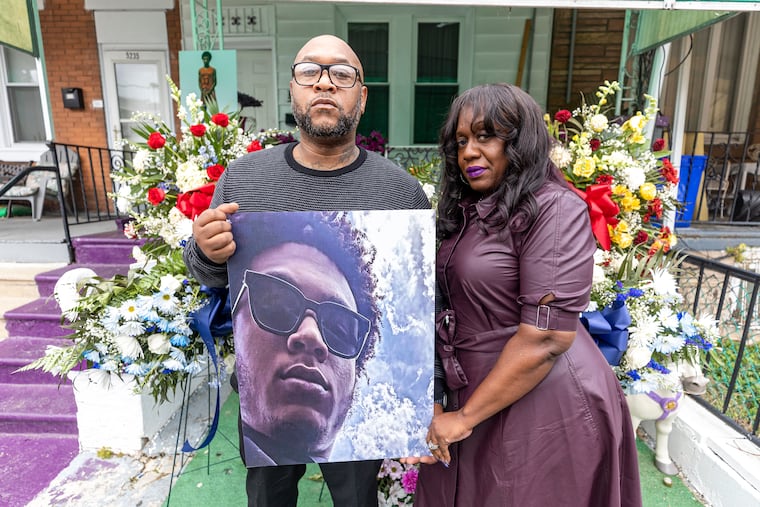Thomas Blackwell VI lost three sons in 2023. Three.
I can’t imagine experiencing so much grief in such a short period of time. I marvel at the Democratic Party committee member's ability to get out of bed each morning and still function.

Last January, Thomas Blackwell VI’s son, Sediec’ Robinson, 19, was shot and killed in Rochester, N.Y., while leaving his job at a fast-food restaurant.
As if that wasn’t bad enough, in April, his child Tommy “Playboy” Blackwell VIII, 23, was found dead on subway tracks in New York City.
Then, in November, a third son, Charles Blackwell II, 20, was fatally stabbed in Pennsauken.
I can’t imagine experiencing so much grief in such a short period of time. I marvel at Blackwell’s ability to get out of bed each morning and still function.
Instead of isolating himself to grieve following the death of not one but three of his sons, the state Democratic Party committee member for the 7th Senatorial District is using his social media platforms to raise awareness about an aspect of domestic violence that is not often discussed: cases in which the victims are men.
After Charles was killed, authorities arrested his live-in girlfriend, Yamil Cuevas, 23, who now faces charges of aggravated manslaughter and weapons offenses.
Investigators have said little about their case against Cuevas, who is currently awaiting trial. As of this writing, she had not yet been assigned a defense attorney, and the Camden County Prosecutor’s Office — citing the ongoing investigation — refused to say whether domestic violence played a role in the case, or provide any other comment.
Looking back at the final months of his son’s life, the elder Blackwell believes Charles had been struggling.
“I didn’t know to what extent he was going through it,” Blackwell told me by phone recently. “But we did know that there was something wrong. All of the signs were there. Sometimes my son was here. Sometimes he wasn’t. There were lengths of time we wouldn’t communicate. There were a lot of signs. We knew but we didn’t know.”
Blackwell said Charles was only 16 when he met Cuevas, who at the time was 19 and already a mother. Together, the couple went on to have two children of their own.
“As parents, that’s not the ideal situation that you want your child to be into,” recalled Sajda “Purple” Blackwell, Charles’ “bonus” mother and an internet radio personality. “The fact that he was trying to financially secure himself so he could help a grown woman and her baby was not something that we ever approved of as parents.”
Blackwell spoke with Charles for the last time a week before his death. He didn’t notice anything unusual until his son began crying and told him, “Dad, I’m going through so much.” Blackwell urged his son to return to their home in West Philly, but he didn’t. They never saw each other again.
“We always encouraged him to come home, but the fear of losing his children overwhelmed him,” Blackwell told me. “When we talk about domestic violence, there’s rarely a conversation about what men go through in these homes. And it’s not just physical. It’s not just mental.”
Over the years, the domestic violence cases I’ve written about have all been of women who have been abused by their male partners. (Seventy women are shot and killed every month by an intimate partner.)
But as I listened to Blackwell, stories of abuse from male victims that I have heard over the years flashed through my head — a friend struck by his child’s mother, another man whose wife used to hit him with household objects.
“Partner violence is perpetrated against men at roughly the same rates as it is perpetrated against women,” Emily Douglas, chair of the department of social work and child advocacy at Montclair State University in New Jersey, told me. “It is oftentimes more physically harmful toward women than it is toward men, but it’s not something that is often recognized as an experience that men have.”
Although an estimated one in three women are subjected to physical violence by an intimate partner, it’s estimated that one in four men also are, according to the National Coalition Against Domestic Violence. However, men are less likely to report being hit or verbally assaulted, often because they’re embarrassed, or don’t believe it’s possible for them to be victims, too.
“Often men don’t really realize that it’s possible for them to be victims of partner violence or partner abuse,” Douglas said.
As Blackwell awaits justice for his son, he is dedicating himself to raising awareness about domestic violence. Help is available for male victims of domestic violence, Blackwell said, “but they need to be educated on how to actually do these things.”
Unfortunately, he was unable to save Charles.
But he’s doing what he can to help victims of domestic violence — both women and men.